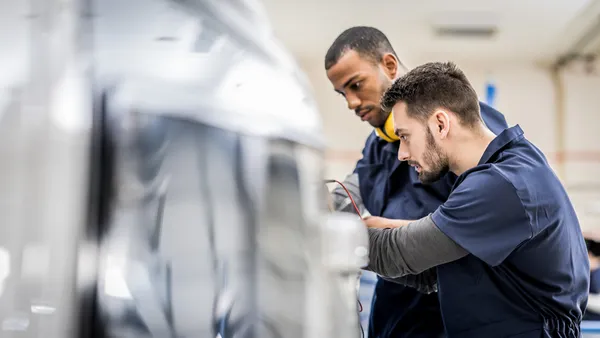HR professionals have read the research on millennials. We know they’re America’s largest generation.1 We know the majority (55%) are not engaged at work.2 And we’ve heard leaders and researchers note that millennials are unlike other generations in the workforce. Are millennials truly that different? Gallup’s CEO says: “The answer is yes — profoundly so. Millennials will change the world decisively more than any other generation.”3
Both research and opinions abound. We’ve focused time and energy identifying differences, yet at the same time they are re-shaping all of our expectations for technology, work and careers. But what if we’re simply speaking the wrong language with millennials? What if engaging and retaining millennials isn’t about entirely transforming practices, rather it’s as easy as speaking their language? Here are few tips to consider for reframing the conversation with millennial talent to help boost engagement and retention with this critical generation.
Say this: “We create a personalized employee experience.” Not this: “We expect you to be engaged.”
We all like to think we’re unique, and today’s rising generation of workers have lived their lives with a more customer-focused experience than previous generations. 2016 data shows that at the root of engagement is “commitment of organizations to the growth and advancement of a generation of workers with new and distinctive needs and expectations. Grads are wary of large companies. They want a more personalized employee experience and they’re not getting it.” Engaging employees requires an employee-centric culture and tools to support staff in their development. Providing support and a proactive approach to learning and development keeps skills current and employees engaged.
Say this: “We support career growth the way you define it.” Not this: “We have a defined career ladder and don’t prefer job-hopping.”
21% of millennials report changing jobs within the last year--more than three times the number of non-millennials who report the same. Gallup estimates millennial turnover costs the U.S. economy $30.5 billion annually. 4 High turnover is one of the hallmarks of millennial workers - or so we thought. “When we look at hard numbers, however, we find that millennials’ rate of job change is not substantially different from that of prior generations,” says one recent study. Millennials are looking for opportunities to grow but that doesn’t always mean job-hopping. The same study found “that once millennials do enter the workforce, their attitudes toward their employers look quite similar to those of previous generations.”5 The perceived lack of fidelity is seen as a challenge, however it is often only the result of a lack of either internal career mobility opportunities or visibility. And millennials are more aggressive in pursuing growth.
Providing opportunities for learning, as well as both lateral and skill-based growth are key to retaining millennials. “Millennials are not pursuing job satisfaction — they are pursuing development,” Gallup found. Rethink the nap pods, free lunches and air hockey—purpose drives millennials. They want learning at the center of their work experience.6
Say this: “We’ll connect you to ongoing coaching and continuous feedback.” Not this: “Be sure to complete your annual performance review.”
Ongoing, in-the-moment feedback supports millennials’ drive to learn and develop. Frequent conversations keep employees (not just millennials) engaged - and lead to better performance. 7 But only 21% of millennials and 18% of non-millennials meet with their managers weekly. Most employees meet with their managers less than once a month (56% for millennials and 53% for non-millennials). 8 Show employees their development is important and discuss how to improve. The investment in time pays off in engagement and retention.
Changing the conversation about millennials requires HR, managers and leaders to speak their language. Increase engagement and retention by recognizing the importance of an employee-centric workplace that supports millennials’ needs for learning and development.
Learn more about how to create career mobility in your organization to engage and retain staff with SumTotal’s latest ebook.
1 “Millennials overtake Baby Boomers as America’s largest generation.” Pew Research Center, April 25, 2016.
2 “How Millennials Want to Work and Live.” Jim Clifton, Gallup, 2016.
3 “How Millennials Want to Work and Live.” Jim Clifton, Gallup, 2016.
4 “How Millennials Want to Work and Live.” Jim Clifton, Gallup, 2016.
5 “Issues by the Numbers A new understanding of Millennials: Generational differences reexamined.” Deloitte University Press, October, 2015.
6 “How Millennials Want to Work and Live.” Gallup, 2016.
7 “How Millennials Want to Work and Live.” Gallup, 2016.
8 “How Millennials Want to Work and Live.” Gallup, 2016.










